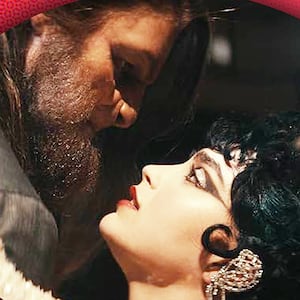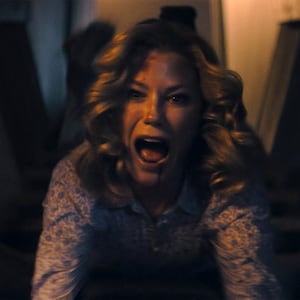For his first major screen role in three years, Billy Crystal plays a child psychologist tasked with caring for a puzzling pint-sized patient in Before. While it’s a decidedly non-comedic part, creator/writer Sarah Thorpe’s 10-part Apple TV+ series, premiering Oct. 25, is often—too often, in fact—unintentionally daffy.
A mystery that begins intriguingly before drowning under the weight of its myriad out-there elements, the series takes little advantage of its star, whose straight-man performance is sturdy if lacking personality, save for the grief and torment weighing upon his heart. It’s a character that doesn’t suit Crystal well, and worse, he’s hampered by a story whose developments veer from beguiling to baffling to laughably bonkers.
Eli (Crystal) specializes in working with adolescents, so he’s more equipped than others would be when he hears scratching at the door of his NYC brownstone and discovers that the culprit is Noah (Jacobi Jupe), an 8-year-old stranger who promptly runs off without explanation. The following night, Noah reappears in Eli’s bedroom (having snuck in through the residence’s dog door), and when he again bolts without a word, Eli follows him to his home, which he shares with his newest foster parent, Denise (Rosie Perez).
There, Eli learns that the boy barely speaks and has drawn a picture of the doctor’s brownstone. Eli takes this with him, and later remarks to his friend Jackson (Robert Townsend) that he feels as if he’s living in someone else’s dream. Jackson replies that Eli should talk to his shaman, to which Crystal’s protagonist replies, “Wish him a happy 1969 for me”—one of the few amusing quips afforded to the headliner.

In the aftermath of his cancer-stricken wife Lynn’s (Judith Light) suicide, Eli has started seeing her in visions, including a new one in which she asks him what the deal is with the postcard of a farmhouse that he’s displaying on his refrigerator. Eli doesn’t know why he’s attracted to the image, but it factors heavily into the ensuing action once Eli is assigned by his boss Gail (Sakina Jaffrey) to handle a new case—who, it turns out, is Noah.
Eli is flabbergasted by this coincidence, and he’s even more confused by Noah himself, who has a habit of going wide-eyed, staring up at the ceiling, opening his mouth, and trembling and making gurgling noises like he’s in the throes of a terrifying hallucination (if not possession). The immediate source of Noah’s fear is black liquid that he sees blooming in ceiling corners and dripping down walls. During one of these episodes, Eli tries to calm the kid and gets slugged in the face, after which Noah speaks in a foreign language that Eli soon identifies as 17th-century Dutch.
None of this makes a lick of sense to Eli, and it won’t be much clearer to viewers, as Before piles on the mystifying twists with gusto. Initially, this makes the show rather gripping, and Eli’s constant refusal to talk about Lynn—whom he found dead in his bathroom’s tub—suggests that there’s a connection between that tragedy and this new bizarre situation.
Trying to make heads or tails of what’s going on, however, is a fool’s errand, at least early on, since Thorpe introduces so many recurring motifs (bloody noses, mirror reflections, freezing and cracking ice) that the truth remains obscured. Still, there’s little doubt that the farmhouse is central to Noah’s condition, given that the child has included it in every one of his numerous charcoal-black drawings—a fact that just about blows Eli’s mind.
Eli is constantly waking in fright from terrible nightmares involving Lynn, blood, and swimming pools, and at outset, he additionally sees a therapist who deduces that those recurring reveries are proof that he thinks of himself as “stuck,” telling him, “You’re a broken, shattered man.” Alas, Eli’s shrink can’t get him to open up about his feelings regarding Lynn’s demise, and the psychologist causes additional concern for his daughter Barbara (Maria Dizzia) when she discovers that, in a fit of rage, he’s decimated his apartment. That outburst has left Eli with a deep hand cut that also proves to be a clue about his relationship to Noah, as are the initials “B.W.,” which appear on the back of Eli’s farmhouse postcard.
Eli professes his belief in science and reason over superstition and faith enough times to foreshadow his character arc. Yet Before is less a leaden sermon about believing in higher powers and the afterlife than a descent into all-consuming goofiness. One moment, legendary violinist Itzhak Perlman is cameoing as one of Eli’s professional colleagues, and the next, Noah is doing a spot-on impersonation of Eli. Throughout, medical concepts like “transference” and “mass psychogenic illness” are bandied about to lend the proceedings some heft, but the narrative which Thorpe weaves becomes loonier with each successive episode.
More frustrating, many plot components are unceremoniously dropped, and those that aren’t wind up being used in outlandish fashion, all of it culminating with revelations that don’t make sense on any level, especially since the show never explicates why Noah, rather than any other child, is embroiled in this wackadoo through-the-ages saga.

While Crystal is given plenty of crazy things to do, the same can’t be said for Light, who’s relegated to an intermittent specter both in the present day and in flashbacks. At the midway point, Hope Davis pops up as a doctor who’s as worried about Eli as she is about Noah, yet she’s merely asked to say obvious things and make absurd decisions, just as Perez only behaves very concerned about her foster son and the possibility that she might lose him to the state.
Everything builds to some dangerous “radical exposure therapy” that’s destined to resolve this madness, although even in its final passages, Before whiffs on the big emotional payoffs that might have justified its wild (and regularly ridiculous) storytelling loop-de-loops. Arguing that we’re all connected to the past through trauma—which is passed down like a barely remembered memory—the show suffers from its own disconnection from logic.









